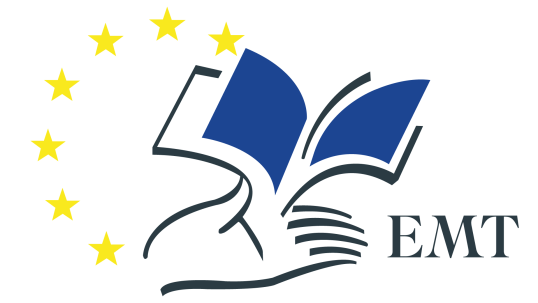European Master's in Translation is a quality label for MA university programmes in translation. The DGT awards it to higher education programmes that meet agreed professional standards and market demands.
These programmes become members of the EMT network.

Only universities in the EMT network are entitled to use the logo which is a registered EU trademark.
Goal
The main goal of EMT is fully in line with the EU priorities for higher education: improve the quality of translator training in order to enhance the labour market integration of young language professionals. The EMT competence framework, drawn up by European experts, is at the core of the project. It defines the basic competences that translators need to work successfully in today's market. More and more universities, also beyond the EU, use it as a model for designing their programmes.
By training highly skilled translators in close cooperation with the language industry the EMT seeks, in the long run, to enhance the status of the entire translation profession in the EU.
Why Join?
As an EMT member your institution will benefit from a partnership with DG Translation including access to short term training placements for your students (depending on the availability in the language departments). You will also benefit from the collective efforts of the network to achieve the following objectives:
- promote a quality label of qualifications
- give more visibility to your study programme
- build up cooperation links
- competence and resource sharing with a view to raising the profile of the EMT member programmes
- take part in an ongoing EMT forum on competences, criteria, resources, methods and requirements
- negotiate with partner associations, institutions, and technical and commercial organisations as a network;
- enhance the status of translation as a profession.
Watch these recordings to learn more about the benefits of EMT membership.
Network activities
In order to realise the above-mentioned goals the EMT members hold regular network meetings to exchange best practices and to cooperate on concrete projects with a view to innovating their curricula and teaching methods. They have also established close cooperation ties with the language industry to stay abreast of the latest developments affecting the translator training (for instance regarding tools and technology, traineeships, employers' expectations).
On the European level this structured dialogue between academia and industry is being followed by the EMT Board and the Board of the Language Industry.
The Directorate-General for Translation supports the EMT by
- organising the EMT Network meetings (depending on the available budget)
- stimulating research cooperation
- promoting academia-business cooperation
- offering training placements for EMT students
In return EMT universities support DGT in continuing professional development activities.
More information about the EMT network activities can be found on the EMT Facebook page and on Twitter and on the EMT blog.
Note:
Documents

- General publications
- 24 April 2024
EMT Annual Report 2023

- General publications
- 24 April 2024
EMT Annual Report 2023
- 4 MAY 2023
- 19 APRIL 2023
- 21 OCTOBER 2022
- 4 AUGUST 2022
- 5 JUNE 2023
